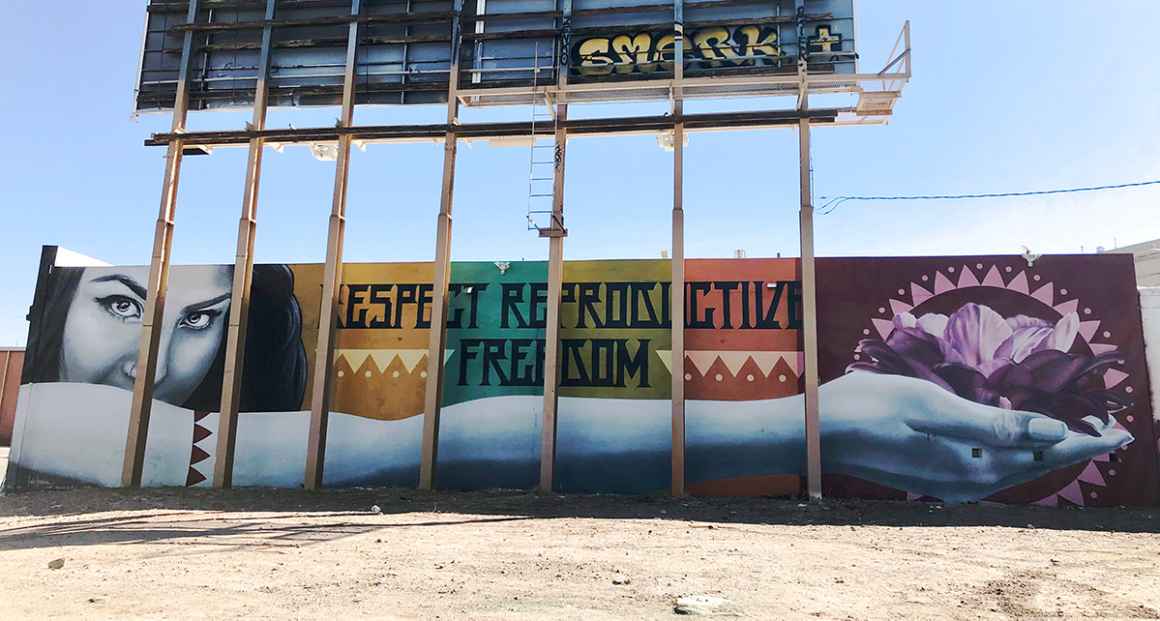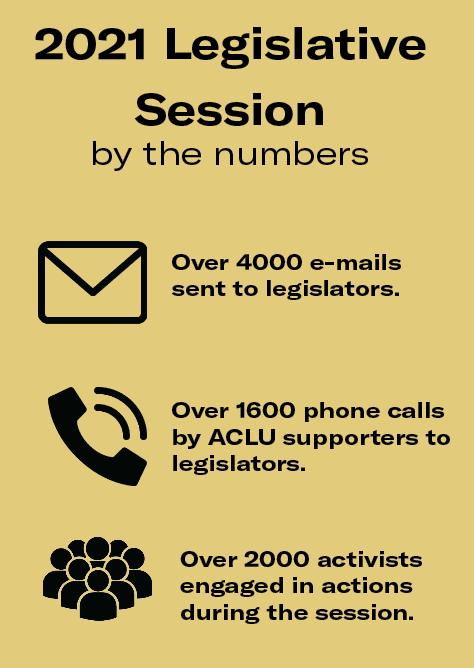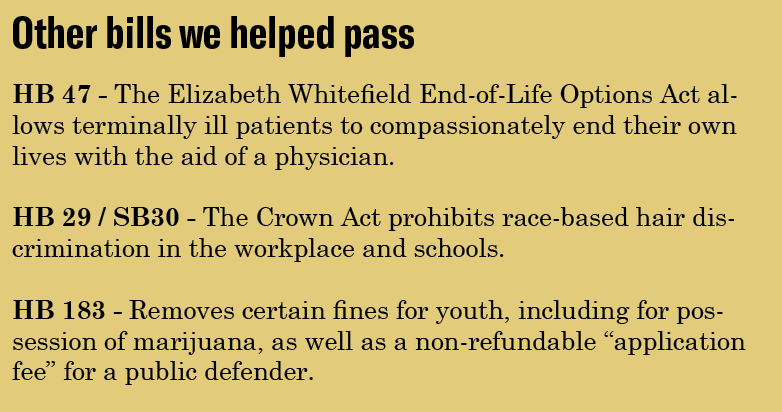Each year, when lawmakers, lobbyists, and advocates pour into the halls of the Roundhouse for legislative session, ACLU of New Mexico staff are poised and ready to fight tooth and nail to pass legislation that will better the lives of New Mexicans. This year, the threat of Covid-19 kept the Capitol doors closed to us and the public, but we headed into the virtual session with equal resolve and our most ambitious agenda yet.
As our country witnessed sustained attacks on our rights and liberties, we crafted a legislative agenda that would help position New Mexico as a place where fairness, justice, and equality can prevail. To do this, we doubled down on efforts to pass critical legislation that failed in previous sessions and identified new progressive bills to support. These bills spanned three key strategic areas of work: reproductive freedom, criminal legal reform, and immigrant rights.
The road to reproductive freedom
The ACLU of New Mexico, in coordination with our partners in the Respect New Mexico Women Coalition, had been trying to pass legislation that would remove an old abortion ban from 1969 since 2017. And with good reason. During his four-year tenure, President Trump waged war on reproductive freedom and health, nominating Supreme Court justices who threaten Roe v. Wade, issuing rules to allow employers to deny contraceptive coverage based on religious objections, and blocking young immigrant women from accessing abortion care. At the same time, states ramped up their efforts to curtail reproductive freedom. In 2019 alone, 8 states passed bans on abortion from the earliest days of pregnancy.
The American people voted Trump out, but threats to reproductive freedom didn’t end with his administration. In the first months of 2021, states introduced nearly 400 measures to restrict access to abortion in an effort to push abortion further out of reach and, ultimately, take the issue all the way to the Supreme Court in hopes of turning over Roe.
"The results of our public education campaign showed us what we always knew to be true — New Mexicans believe politicians should not get in the way of our reproductive health decisions"
We knew we had to get New Mexico’s old abortion ban off the books so that if Roe were struck down, pregnant people and their families coud make their own healthcare decisions without the threat of being forced to go before a panel of strangers to beg for care and potentially face a felony investigation or conviction. And healthcare providers could provide care without the same threat.
Though our efforts to remove the ban were unsuccessful in 2017, 2018, and 2019, we were undeterred. In 2019, we came closer than ever before to victory, falling short of a win by only three votes. Those legislators who voted against protecting healthcare were facing challengers in upcoming primary elections, and we believed New Mexicans wouldn’t take attacks on their freedom lightly. So, in May, we partnered with the national ACLU to launch a voter education campaign in key districts, informing communities about state senators’ records on protecting access to abortion. New Mexicans responded by voting out anti-abortion lawmakers and voting in lawmakers who vowed to protect pregnant people’s right to make their own healthcare decisions.
“The results of our public education campaign showed us what we always knew to be true — New Mexicans believe politicians should not get in the way of our reproductive health decisions,” said Ellie Rushforth, reproductive rights counsel at the ACLU of New Mexico. “Voters sent a clear message to lawmakers that they would lose the support of their constituents if they failed to uphold access to abortion care.”
State Representative Micaela Lara Cadena and state Senator Linda Lopez led the charge to introduce versions of the bill in the House and Senate. They were joined by Speaker of the New Mexico House Brian Egolf, Senate Majority Leader Peter Wirth, Reps. Joanne Ferrary, Georgene Louis, and Debbie Armstrong and 23 other state senators when it was introduced in the Senate.
With a legislature comprised of people willing to repeal this outdated law, and sponsors championing the legislation, we set our strategy into motion. Alongside our partners in the Respect New Mexico Women Coalition — an intersectional movement of women, families, faith leaders, medical providers, and Indigenous, Black, and Latinx reproductive justice leaders -- we mobilized our communities to ensure lawmakers would finally vote to protect reproductive freedom.
A broad range of New Mexicans answered our call and joined the cause. Birth workers, nurses, and doctors testified and wrote public comments supporting the bill and their associations endorsed repeal. Brave individuals shared the personal stories that led them to become advocates for reproductive freedom and justice. And thousands of people sent messages and made phone calls to legislators.
ACLU of New Mexico staff members, like Ellie Rushforth, who served as an expert witness on the bill, were right beside our allies, lending support in big and bold ways. We also launched a new and creative public project, partnering with renowned local artist, Jodie Hererra, on a mural in downtown Albuquerque intended to inspire respect for New Mexicans’ reproductive health decisions.

PHOTO: Respect Reproductive Freedom mural as painted by artist Jodie Herrera.
Our efforts leading up to and through the session paid off. In late February, the Senate version of the bill passed and was signed into law by Governor Michelle Lujan Grisham.
“This is a truly momentous victory for women and pregnant people in our state,” Rushforth said. “At a time when anti-abortion politicians continue to erode abortion rights across the country, New Mexico lawmakers voted to secure a future where all people in New Mexico have the right and ability to determine their own lives and seek the care that is right for them and their families without fear of punishment.”
With the abortion ban finally off the books, the ACLU of New Mexico will focus its efforts on expanding access to abortion care and making sure the full scope of reproductive health services and rights are equitably available to all.
Holding police and public officials accountable
In the summer of 2020, the police killings of George Floyd, Breonna Taylor, and Tony McDade reverberated across the nation. Millions of Americans, fed up with police violence against Black and Brown communities, and reeling from a global pandemic that has disproportionately taken the lives of people of color, participated in demonstrations over several weeks.
The ACLU of New Mexico has long worked to end police brutality in our communities in the streets, courts, and halls of Congress, and were ready to marshal every tool at our disposal to stamp out police abuse of power. When the governor called a special session in June of 2020, we set our eyes on passing a New Mexico Civil Rights Act. Although New Mexico’s state constitution offers robust protections, our state lacked a legal avenue for seeking redress for violations of those rights, and we knew that if we were ever to hold police officers and other public officials accountable for misconduct, we would need to create a legal mechanism for people to bring claims in court.
“Our rights were guarantees on paper, but not in fact,” said ACLU of New Mexico Executive Director Peter Simonson. “The United States Congress passed a civil rights act in 1871 for this very reason. We sought to breathe life into our cherished liberties and ensure people could actually exercise the rights promised to them under our state Bill of Rights.”

Much like the federal Civil Rights Act of 1871, which was passed to stop police officers from ignoring Klan lynchings against newly freed Black citizens, the need for a New Mexico Civil Rights Act was born of tragedy and racialized violence. Nearly 150 years after Congress passed a federal Civil Rights Act, Black people continue to face unjustified violence and brutality at the hands of police officers, with little, if any, accountability for their actions.
While we came up short of a Civil Rights Act in the special session, we did help pass a bill to form a New Mexico Civil Rights Commission, a bipartisan nine-member body tasked with evaluating and making recommendations about a cause of action for violations of state constitutional rights and reviewing the use of qualified immunity as a defense. In November, the commission voted to recommend passing a Civil Rights Act that would explicitly bar the defense of qualified immunity — a federal judicial doctrine, invented by the United States Supreme Court in the late 1960’s, that allows public officials who abuse their power to escape consequences so long as they did not violate “clearly established law.”
By the time the 60-day session began in January 2021, when Speaker Brian Egolf, Rep. Georgene Louis, Senator Joseph Cervantes, and Rep. Patricia Roybal Caballero, introduced HB 4, we had already been educating and mobilizing communities about the need for the New Mexico Civil Rights Act.
We partnered with non-traditional allies, like Americans for Prosperity New Mexico, as well as local and national partners, such as Planned Parenthood New Mexico, Equality New Mexico, The National Police Accountability Project, and The Innocence Project to highlight the importance of passing the bill and to push back on an onslaught of opposition from police unions and counties.
When police unions claimed the bill would make their jobs impossible and county governments claimed, without evidence, that the bill would bankrupt them, we reminded legislators of the human costs that derive from a lack of access to justice. Though it was a difficult and heavy lift, thanks to the tireless works of advocates, the New Mexico Civil Rights bill was signed into law in April.
“The passage of HB 4 is an incredible triumph for the people of New Mexico, especially Black, Brown, Indigenous, and other marginalized people who are disproportionately harmed by police and other government employees, and who now have a fair chance at achieving justice,’” said ACLU of New Mexico Senior Policy Strategist Barron Jones. “HB 4 should serve as a model for other states fighting to stamp out abuse and make their communities more just places to live.”
Advancing criminal legal reform
It’s no secret that our “justice system” often does not dispense justice. New Mexico’s prisons are filled with people who are incarcerated due to harsh policies that stem from the War on Drugs. And yet this war has done nothing to help people suffering from substance abuse. Instead, it has reigned terror on Black and Brown communities, who have been disproportionately arrested and locked up for drug possession, and fueled a system of mass incarceration. It has, in effect, been a war on people.

The ACLU has fought to implement decriminalization and legalization of cannabis laws across the country, helping to keep people who pose no danger to public safety out of the criminal legal system. Here in New Mexico, we’ve been working to legalize cannabis, alongside our partners in New Mexico SAFE, since 2019. This year, we supported a bill that not only legalized cannabis, but also included equity and restorative justice measures, including the automatic expungement of criminal records for people convicted of low-level offenses. Although the bill stalled during the regular session, Governor Lujan Grisham called a special session at the end of March, when the bill was passed and signed into law.
“The War on Drugs has decimated our communities, while failing to make us any safer,” said Elaine Maestas, police accountability strategist at the ACLU of New Mexico. “Legalizing cannabis is a giant step forward in ending the over-policing of communities of color and the failed system of mass incarceration.”
Working to expand immigrant rights
In four years, Donald Trump did more to terrorize and tear apart immigrant families than any other president in our nation’s history. Heading into the session, one of our top priorities was to pass legislation that would prohibit policies and practices that harm immigrant families and allow them to live in safety and dignity.
Along with our partners at Somos un Pueblo Unidos, we have been advocating for a bill since 2020 to prohibit state agencies from sharing private, sensitive information with federal agencies like the Immigration and Customs Enforcement Agency (ICE) and the U.S. Census Bureau. Building on our work from last year, when we co-published a report revealing that state agencies have been disclosing New Mexicans’ sensitive personal information to federal agencies and highlighting the dangers of doing so, we successfully ushered this bill through both chambers. Unfortunately, the governor did not sign the bill by the deadline, and it was pocket vetoed. Given the bipartisan support this bill received, we are hopeful we can pass it in a future session.
"We demonstrated to lawmakers and the governor that our communities are eager to move away from Trump-era policies that endanger immigrant families and shore up local protections in New Mexico."
We also supported a bill to ban private contractors from running detention facilities, including immigrant detention facilities in New Mexico. Along with a broad coalition of immigrants rights activists, People Over Private Prisons-New Mexico (POPPNM), we educated our communities about the abuse and neglect that takes place inside private facilities, garnered widespread media attention, and mobilized thousands of people to call and send messages to legislators. Although this bill stalled in the House, we built critical momentum that will help move us closer to passing it in subsequent sessions.
“We demonstrated to lawmakers and the governor that our communities are eager to move away from Trump-era policies that endanger immigrant families and shore up local protections in New Mexico,” said Nia Rucker, policy counsel and regional manager at the ACLU of New Mexico. “Through our advocacy and communications work, we laid the foundation for continuing this crucial work in years to come.”
The ACLU of New Mexico will continue its work advancing immigrant rights outside of the session through our humane border campaign with ACLU border affiliates in California, Arizona, Texas, and our national organization.

The future we believe in
Many of our biggest victories this session were years in the making. When these bills stalled in prior sessions, we didn’t give up. We dug our heels in, expanded our partnerships, mobilized communities, and demonstrated to lawmakers that New Mexicans are unyielding in their determination to make our state a more fair, free, and just place to live. This session, we showed that when we work together, we win.
Together, we chose to hold police and public officials accountable to the people they serve. We chose to trust pregnant people to make the right healthcare decisions for them and their families. We passed legislation that will advance racial and economic justice and chip away at the failed War on Drugs. And while we didn’t get all of our bills over the finish line, one thing is for sure: We will not give up. We’ll be back, undeterred, and ready to lead justice forward in New Mexico.



